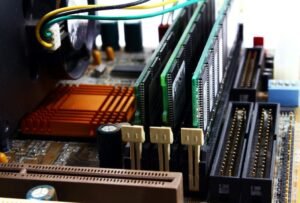Are Artificial Intelligence and Democracy Compatible?
As artificial intelligence (AI) continues to advance in various fields, there is an ongoing debate about its compatibility with democracy. While AI has the potential to streamline processes and improve decision-making, concerns arise regarding individual privacy, bias, and the concentration of power. This article explores the intersection of AI and democracy and examines the implications of their coexistence.
Key Takeaways:
- AI offers the potential for more efficient and informed decision-making.
- Privacy concerns arise with the increased use of AI in data collection and surveillance.
- The transparency and accountability of AI systems need to be ensured to mitigate bias.
- The concentration of power in the hands of a few entities may pose threats to democracy.
- Regulatory frameworks must strike a balance between innovation and protecting democratic values.
**Artificial intelligence** refers to the simulation of human intelligence by machines that can perform tasks typically requiring human intelligence, such as visual perception, speech recognition, and decision-making. While AI advancements have shown immense potential to benefit society, there are ongoing discussions about the **ethical implications** and compatibility of AI with democratic principles.
*AI-driven decision-making* has the potential to enhance the efficiency and accuracy of democratic processes. AI systems can analyze vast amounts of data and provide valuable insights to inform policy-making and resource allocation. Automated systems can facilitate faster processing and evaluation of information, reducing human error and bias.
In parallel, however, there are concerns about individual **privacy** in the age of AI. The increased use of AI in data collection, analysis, and surveillance raises questions about the ethical boundaries and limits of monitoring citizens. As AI systems become more capable of extracting personal information, it is crucial to strike a balance between the benefits of AI-driven decision-making and protecting personal privacy and civil liberties.
The Role of Bias and Accountability
*Bias* is a fundamental concern when it comes to AI and democracy. AI algorithms are trained using vast amounts of historical data, which may perpetuate biases present in the data. Biased AI systems have the potential to reinforce inequalities, discriminate against specific groups, or fail to represent diverse perspectives accurately.
Ensuring the **transparency** and accountability of AI systems is crucial to address bias. Governments and organizations should be transparent about how AI systems are developed and trained. Furthermore, there should be mechanisms in place for auditing and challenging the decisions made by AI systems. By promoting algorithmic transparency and accountability, the potential biases in AI systems can be more readily identified and corrected.
Tables:
| Country | AI Policy Development |
|---|---|
| United States | A rapidly evolving regulatory landscape aimed at striking a balance between innovation and privacy concerns. |
| China | Government-driven initiatives led by state-owned enterprises with a focus on innovation and surveillance capabilities. |
| European Union | Strict regulations emphasizing privacy and data protection, considering the potential societal impact of AI systems. |
Moreover, the issue of **power concentration** arises with the rise of AI. Large technology companies and governments often hold substantial amounts of data, resources, and expertise required for developing AI systems. Concentration of power in the hands of a few entities may lead to oligopolies or monopolies, limiting competition and potentially compromising democratic decision-making processes.
Regulatory Frameworks and Democratic Values
To ensure the compatibility of AI and democracy, **robust regulatory frameworks** are necessary. These frameworks should encompass ethics, privacy protection, and accountability to protect democratic values while fostering innovation and development in AI. Striking a balance between safeguarding individual rights and facilitating technological progress is crucial for sustainable coexistence.
*Regulations should encourage responsible AI deployment* that respects individual privacy and avoids exacerbating existing social biases. Democratically-informed policies should guide the development, deployment, and use of AI systems to prevent the concentration of power and ensure the equitable distribution of benefits.
Tables:
| Concern | Recommended Measures |
|---|---|
| Bias and discrimination | Algorithmic transparency and accountability, diverse data sets for training, and audits for potential bias identification. |
| Privacy and surveillance | Clear regulations on data collection and usage, privacy-preserving AI techniques, and user consent frameworks. |
| Power concentration | Anti-monopoly regulations, promoting competition and innovation, open data initiatives. |
*In conclusion*, the question of whether AI and democracy are compatible depends on how society navigates the rapid advancements in AI. While AI has the potential to improve decision-making, it must be developed and deployed responsibly, with safeguards in place to protect individual rights, ensure transparency, and prevent the concentration of power. Striking a balance between regulation and innovation will be crucial in building a future where AI and democracy coexist harmoniously.

Common Misconceptions
Misconception 1: Artificial intelligence will replace human decision-making in a democracy
One common misconception is that artificial intelligence (AI) will completely replace human decision-making processes in a democracy. However, this is not the case. AI can certainly assist in decision-making and provide valuable insights, but the final decisions should always be made by humans who are accountable to the people they represent.
- AI can help analyze large amounts of data to inform decision-making processes.
- Human judgment and values are necessary to weigh the ethical considerations involved in decision making.
- AI can support decision-making in democracies but cannot replace the need for human input.
Misconception 2: AI has inherent biases that undermine democratic principles
Another misconception is that AI systems inherently contain biases that undermine democratic principles. While it is true that AI can reflect biases present in the data it learns from, it is important to understand that these biases can be identified, addressed, and mitigated through careful design and ongoing monitoring.
- AI systems can be programmed to recognize and correct for biases in data.
- Transparency and accountability in AI algorithms can help identify and address biases.
- Ongoing monitoring and improvement of AI systems can minimize biases and ensure democratic principles are upheld.
Misconception 3: AI will lead to the concentration of power and undermine democracy
Some people believe that AI will lead to the concentration of power in the hands of a few, thereby undermining democracy. However, this misconception fails to consider that AI can also empower individuals and promote participation in decision-making processes.
- AI can provide access to information and empower individuals to make informed decisions.
- AI can facilitate citizen engagement by enabling greater transparency and feedback mechanisms.
- While concentration of power is a potential risk, societal safeguards and regulation can ensure AI is used to promote democracy rather than undermine it.
Misconception 4: AI will eliminate jobs and leave people unemployed
Many people assume that AI will eliminate jobs and leave people unemployed, which can create skepticism around its compatibility with democracy. While it is true that AI may disrupt certain job sectors, it also creates new job opportunities and can enhance productivity and economic growth.
- AI can automate repetitive tasks, allowing humans to focus on more complex and creative work.
- New industries, such as AI development and maintenance, will create job opportunities.
- Policies can be implemented to ensure a just and fair transition for workers affected by AI technologies.
Misconception 5: AI is too complex for citizens to understand and participate in decision-making
Lastly, there is a misconception that AI is too complex for citizens to understand, making it incompatible with democratic decision-making processes. However, efforts can be made to promote digital literacy and provide accessible platforms that enable citizens to understand and engage with AI systems.
- Education and awareness campaigns can help citizens understand the basic concepts of AI and its impact on society.
- User-friendly interfaces and transparent explanations of AI processes can increase citizen participation.
- Collaborative models that involve citizens in the design and development of AI systems can promote understanding and inclusive decision-making.

Introduction
As we dive deeper into the era of Artificial Intelligence (AI), questions about its compatibility with the democratic system arise. This article explores various aspects of this debate, presenting data and information to shed light on the subject. The following tables provide insights into key elements discussed in this article.
Table: Global AI Investment
In recent years, the investment in AI technologies has been substantial globally. This table showcases the top five countries that have made the highest investments in AI.
| Country | AI Investment (in billions) |
|---|---|
| United States | 16.5 |
| China | 9.7 |
| Japan | 3.3 |
| Germany | 2.9 |
| United Kingdom | 1.9 |
Table: Public Opinion on AI
This table highlights the public opinion on AI technologies across different age groups. It reflects how the perception of AI differs among generations.
| Age Group | Positive View (%) | Negative View (%) | Neutral View (%) |
|---|---|---|---|
| 18-24 | 60 | 20 | 20 |
| 25-34 | 45 | 30 | 25 |
| 35-44 | 40 | 35 | 25 |
| 45+ | 30 | 40 | 30 |
Table: AI Application Areas
This table showcases various sectors where AI applications are being used, giving an overview of how AI is influencing different industries.
| Sector | AI Application |
|---|---|
| Healthcare | Precision Medicine |
| Finance | Algorithmic Trading |
| Manufacturing | Robotic Automation |
| Transportation | Autonomous Vehicles |
Table: AI Impact on Job Market
This table presents the projected impact of AI technologies on various job sectors. It highlights the potential displacement and creation of jobs due to the integration of AI.
| Job Sector | Projected Job Loss (%) | Projected Job Creation (%) |
|---|---|---|
| Manufacturing | 20 | 15 |
| Transportation | 25 | 10 |
| Customer Service | 35 | 5 |
| Healthcare | 15 | 20 |
Table: AI Bias in Decision-Making
This table illustrates the issue of bias in AI algorithms and its impact on decision-making processes. It emphasizes the importance of addressing and mitigating biases.
| Algorithmic Decision-Making Scenario | Bias Detected |
|---|---|
| Loan Approval | Ethnicity Bias |
| Job Applicant Screening | Gender Bias |
| Criminal Sentencing | Racial Bias |
Table: AI Regulation Comparisons
This table compares the regulatory approaches to AI in different countries. It showcases the level of government intervention and policy development.
| Country | AI Regulation |
|---|---|
| United States | Self-regulation with guidelines |
| China | Government-led regulation |
| European Union | Comprehensive legislation |
| Canada | Collaborative industry-standard approach |
Table: AI Adoption by Governments
This table displays the adoption of AI technologies by different governments worldwide, indicating the level of integration in governance processes.
| Country | Government AI Adoption Level |
|---|---|
| Estonia | High |
| United Arab Emirates | Medium |
| United States | Low |
| Germany | Medium |
Table: AI Ethics Initiatives
This table highlights prominent initiatives and organizations working toward establishing ethical guidelines for AI development and deployment.
| Initiative/Organization | Focus Area |
|---|---|
| Partnership on AI | Ethical standards for AI |
| The IEEE Global Initiative | AI Governance |
| AI Now Institute | Social implications of AI |
| Future of Life Institute | AI safety |
Conclusion
Artificial Intelligence is a rapidly advancing technology that presents both opportunities and challenges in democratic societies. The tables presented throughout the article provide a glimpse into the global investment in AI, public opinion, AI applications, job market impact, bias in decision-making, regulatory approaches, government adoption, and ethical initiatives. Understanding and addressing these aspects is crucial for ensuring that AI and democracy can coexist harmoniously, with proper safeguards in place.
Frequently Asked Questions
What is artificial intelligence (AI)?
Artificial intelligence refers to the development of computer systems capable of performing tasks that typically require human intelligence. AI enables machines to learn from experience, adjust to new inputs, and carry out complex tasks with minimal human intervention.
What is democracy?
Democracy is a system of government in which power is vested in the people and exercised through a fair and transparent electoral process. It ensures citizen participation, protection of individual rights, and accountability of the government to the people.
Are AI and democracy compatible with each other?
The compatibility between AI and democracy is a subject of ongoing debate. While AI has the potential to enhance democratic processes and improve governance, concerns also exist regarding the concentration of power, privacy issues, and the possible exclusion of certain groups from decision-making processes.
How can AI enhance democracy?
AI can enhance democracy by improving information accessibility, facilitating more efficient decision-making processes, enabling personalized communication with citizens, and assisting in the development of evidence-based policies, among other possibilities.
What are the potential challenges of AI for democracy?
Challenges associated with AI in a democratic context include the risk of biased decision-making, lack of transparency in algorithms, potential surveillance concerns, erosion of privacy, and the potential for social and economic inequalities to be exacerbated.
Can AI be used to manipulate democratic processes?
There is a risk that AI can be used to manipulate democratic processes, such as through the spread of misinformation, targeted advertising, or the use of algorithmic biases. It is crucial to establish robust safeguards and regulations to address these concerns.
How can society ensure the ethical use of AI in a democratic context?
Ensuring the ethical use of AI in a democratic context requires a combination of transparent regulations, unbiased and auditable algorithms, inclusivity in decision-making processes, strong privacy protection, and ongoing public engagement and scrutiny of AI applications.
What role can citizens play in shaping AI’s impact on democracy?
Citizens can play a fundamental role in shaping AI’s impact on democracy by engaging in public discourse, advocating for transparency and accountability, participating in consultations and policy-making processes, and having access to reliable information to make informed decisions.
How can governments address concerns about AI and preserve democratic values?
Governments can address concerns about AI and preserve democratic values by establishing robust regulatory frameworks, fostering collaboration between stakeholders, investing in research and development for AI ethics, and ensuring public awareness and understanding of AI technologies.
Are there any examples of AI being successfully integrated into democratic systems?
Several countries have started exploring the integration of AI into their democratic systems. Examples include using AI for predictive analytics to identify potential policy impacts, developing chatbot systems for citizen engagement, and utilizing AI in the analysis of large datasets to inform evidence-based policy-making.




